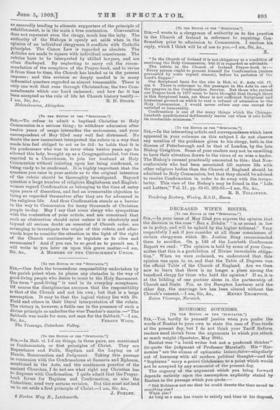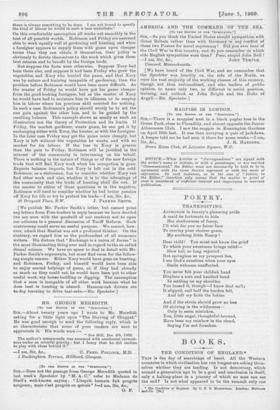ECONOMIC SOPHISMS.
[To THE EDITOR Or TUE "SPECTATOR."] Sia,—You hardly do yourself justice when you prefer the words of Bastiat to your own to state the case of Free-trade at the present day, but I do not think your Tariff Reform readers need shrink from the arguments to which you attach so much weight (Spectator, May 29th).
Bastiat was ".a lucid writer but not a profound thinker' (to quote the judgment of Professor Marshall). His " Har- monies" are the climax of optimistic laissez-faire—singularly out of harmony with all modern political thought—and his " Sophisms " carry a priori Cobdenism to a point which would not be accepted by any economist of the present day.
The cogency of the argument which you bring forward depends entirely upon the assumption explicitly stated by Bastiat in the passage which you quote :-
"Did Did Robinson not see that he could devote the time saved to
something else? What else P
• AS long as a man has wants to satisfy and time at his disposal,
there is always something to be done. lain not bound to specify the kind of labour ho would in such .a ease undertake."
On this comfortable assumption all works out smoothly in the best of all possible worlds. Robinson and Friday are assumed able to work equally well at gardening and hunting, and when a foreigner appears to supply them with • game upon cheaper terms than they can obtain it themselves, their policy is obviously to devote themselves to the work which gives them best returns and to benefit by the foreign trade.
But suppose the facts were otherwise. Suppose Xury bad been there also, and suppose it had been Friday who grew the vegetables, and Xury who bunted the game, and that Xury was by nature and training incapable of gardening, then the problem before Robinson would have been more difficult, As the master of Friday hi) would have got his game cheaper from the good-looking foreigner, but as the master of Xury be would have had to maintain him in idleness, or to employ him in labour where his previous skill counted for nothing. In such a case Robinson's policy should surely be to set the one gain against the other loss, and to be guided by the resulting balance. This example shows as neatly as such an illustration can the theory of Protection and its limits. If Friday, the market gardener, wants game, he can get it by exchanging either With Xury, the hunter, or with the foreigner. In the later case Friday may get the game more cheaply, but Xury is left without the vegetables he wants, and with no market for his labour. If the loss to Miry is greater than the gain to Friday, Robinson will be justified in the interest of the community in intervening on his behalf. There is nothing in the nature of things or of the new foreign trade that will find Xury work when his occupation is gone. Exports balance imports, but Xury is left out in the cold. Robinson, as a statesman, has to consider whether Xury can find other work and also, whether it is to the advantage of the community that the trade of hunting shall die out. If the answer to either of these questions is in the negative. Robinson will need to consider whether ho bad better pension off Xury for life or try to protect his trade.—I am, Sir, Sce., [We publish Mr. Parker Smith's letter, but cannot print any letters. from Free-traders in reply because we have decided (we are sure with the goodwill of our readers) not to open our columns to a general discussion of Tariff Reform. Such controversy could serve no useful purpose. We cannot, how- ever, admit that Bastiat was not a profound thinker. On the ebntrary, we regard him as the profoundest of all economic writers. His dictum that "Exchange is a union of forces" is the most illuminating thing ever said in regard to the so-called dismal science. We have no space to deal in detail with Mr. Parker Smith's arguments, but must find room for the follow- ing simple answer. Either Xury would have gone on hunting, and Robinson, Friday, and himself would have been able to enjoy second helpings of game, or, if they had already as Much as they could eat, he would have been put to other useful work, say house-building or digging. The assumption that a man is incapable of all other work because what be does best is bunting is absurd. Hansom-cab drivers are to-day learning to drive taxi-cabs.—En. Spectator.]











































 Previous page
Previous page